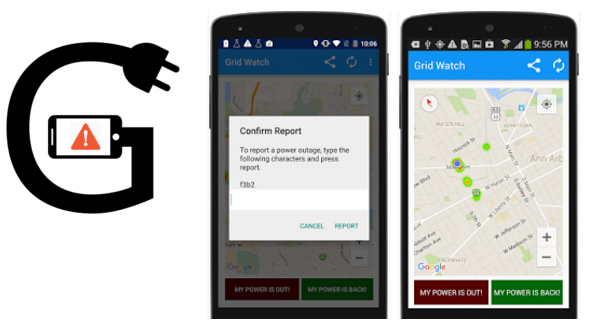GridWatch named finalist in Vodafone’s eighth annual Wireless Innovation competition
GridWatch can detect power outages by monitoring changes to its own power state, locally verifying these outages using a variety of sensors that reduce the likelihood of false power outage reports, and corroborating actual reports with other phones through data aggregation in the cloud.

 Enlarge
Enlarge
GridWatch, a system for monitoring the state of the power grid using smartphones, has been selected as one of eight finalists in the Vodafone Americas Foundation’s eighth annual Wireless Innovation Projectcompetition.
The power grid is one of humanity’s most significant engineering undertakings, and it is essential in developed and developing nations alike. Currently, transparency into the power grid relies on utility companies and more fine-grained insight is provided by costly smart meter deployments. Through GridWatch, a smartphone app, the researchers provide an inexpensive and crowd-sourced manner for learning about power grid status independent of utility companies.
GridWatch can detect power outages by monitoring changes to its own power state, locally verifying these outages using a variety of sensors that reduce the likelihood of false power outage reports, and corroborating actual reports with other phones through data aggregation in the cloud. This approach enables a decentralized system that can scale, potentially providing researchers and concerned citizens with a powerful new tool to analyze the power grid and hold utility companies accountable for poor power quality. The researchers’ paper demonstrates the viability of the basic idea, identifies a number of challenges that are specific to this application as well as ones that are common to many crowd-sourced applications, and highlights some improvements to smartphone operating systems that could better support such applications in the future.

 Enlarge
Enlarge
The GridWatch team is now working with major multinational corporations and utilities in developing regions to provide visibility into grid conditions for researchers, ratepayers, and regulators.
GridWatch is a collaboration between researchers at University of Michigan and the University of California Berkeley. The Michigan researchers include Prof. Prabal Dutta and graduate students Noah Klugman, Pat Pannuto, and William Huang.
 MENU
MENU 
